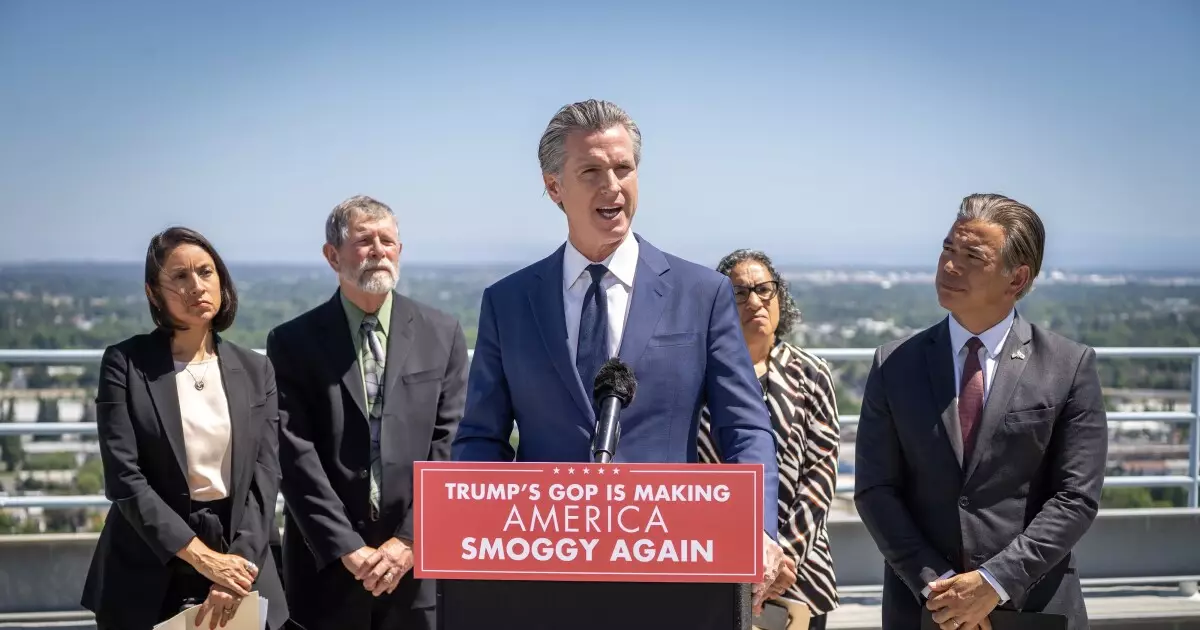California’s Bold Stand: 5 Reasons Why Defending Emission Standards Matters

In a striking move that highlights the ideological rift in contemporary American politics, California is poised to file its 23rd lawsuit against the Trump administration. This legal action emerges from an aggressive federal initiative aimed at dismantling California’s stringent vehicle emission regulations, which have long set the standard for environmental policy in the United States. Governor Gavin Newsom’s ambitious executive order to phase out gas-powered vehicles by 2035 stands at the center of this storm. The anticipated legislation reflects a broader pattern of disregarding state autonomy in favor of a federal baseline that many deem woefully inadequate in addressing the urgent crisis of climate change.
Attorney General Rob Bonta’s comments reflect a genuine concern that the federal push undermines not only environmental progress but also the health and economic future of Californians. His assertion that the administration’s maneuvers are “illegal” carries substantial weight in a legal context. The wider implication here is that California is not merely defending local regulations but is also leading a moral and political charge against an administration that views environmental initiatives through a partisan lens.
Historical Context: Bipartisanship in Environmental Policy
What makes California’s position particularly compelling is its historical context. Not too long ago, decisions about air quality and emissions were often made with an eye toward bipartisan consensus. Republicans like Richard Nixon and Ronald Reagan recognized the importance of clean air long before it became a polarizing issue. California’s ability to secure over 100 waivers from the federal Environmental Protection Agency since the Clean Air Act of 1970 is a testament to this cooperative spirit in addressing environmental challenges.
However, the current Trump-era policies starkly contrast this history. By flouting established precedent and ruling against even the Senate parliamentarian’s advice, the administration exhibits not just a political maneuver but a clear rebuff of the collaborative efforts that once characterized American environmental policy. Newsom’s comparison of today’s policies to those of past Republican leaders exemplifies the divergence from a largely cooperative approach to a sharply partisan battle.
The Economic Implications: Jobs and Clean Energy
The implications of this legislative tussle extend beyond clean air; they touch on economic vitality as well. California is on the forefront of an electric vehicle (EV) revolution, spearheading innovations that promise significant job creation across multiple sectors. The Trump administration’s actions pose a real threat to this potential, viewing environmental regulation as an economic liability rather than an opportunity for growth. If the state succeeds in maintaining its regulatory framework, it not only positions itself as a leader in sustainable technology but also secures jobs for its residents.
There is an irony at play here: while the federal government seeks to advance the interests of “big oil” and foreign powers, it risks ceding ground to nations such as China, which is aggressively investing in green technologies. California’s push for cleaner air and electric vehicles is not just about environmental responsibility; it represents a strategic economic choice, an investment in a cleaner, sustainable future.
The Public Health Crisis: A Call to Action
Perhaps the most immediate concern arising from any rollback of California’s emission standards is the public health crisis that looms over the state. Data reveal that millions of Californians, particularly in the San Joaquin Valley and Los Angeles Basin, are living in areas with hazardous air quality. High rates of asthma and respiratory illnesses are alarming indicators of the dire health impacts that can result from poor air quality. The administration’s actions to annul California’s progressive standards are tantamount to putting financial interests above public health.
With nearly 10 million individuals living in serious ozone nonattainment conditions, the stakes are exceedingly high. The emotional and physical toll of respiratory diseases cannot be overstated, particularly during a pandemic that has disproportionately affected those with underlying health issues. This paints the battle as not just a legal or political one, but as a fundamental issue of life and death.
The Future of Environmental Activism
As California braces for what is likely to be a lengthy legal battle, the broader question looms: what does this mean for environmental activism in America? The state’s unwavering commitment to its emission standards serves as a beacon for other states contemplating similar measures. If California can successfully counter federal encroachments, it lays the groundwork for invigorating a national conversation about environmental responsibility and the need for sustainable policies that transcend partisan divides.
California’s dilemma stands as an emblem of the larger conflicts shaping American governance today. The outcome of this struggle will define not just the state, but potentially the trajectory of environmental policies across the nation, challenging the rest of the country to consider what kind of future they wish to inherit. The stakes could not be higher.





